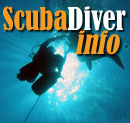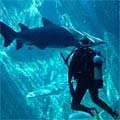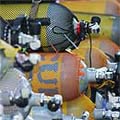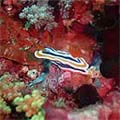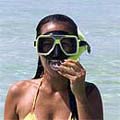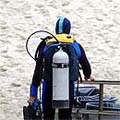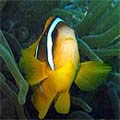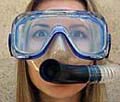 Now for something different. This is a breath-hold diver recollection book and one where scuba doesn't always looks so good. It's as different from the stack of northeastern wreck diving books I've recently read as is possible, and so is the author, Carlos Eyles. Eyles was born in Hawaii where he began his love affair with the sea, then relocated to Southern California where he never was quite happy. Born in 1941, Eyles' life meandered here and there, with far more extreme undulations than most. He was a family man on a career path, a dedicated spearfisherman, a near-drifter living on a small craft in a marina, went back to a successful career and the conventional American dream, dabbled in Timothy Leary-like explorations, gave it all up again to live in and on the sea, sailed and explored for years in hermit-like fashion, lived on a beach in the Fiji islands, returned, got married again and sort of settled into a career as a writer and underwater photographer. Whew.
Now for something different. This is a breath-hold diver recollection book and one where scuba doesn't always looks so good. It's as different from the stack of northeastern wreck diving books I've recently read as is possible, and so is the author, Carlos Eyles. Eyles was born in Hawaii where he began his love affair with the sea, then relocated to Southern California where he never was quite happy. Born in 1941, Eyles' life meandered here and there, with far more extreme undulations than most. He was a family man on a career path, a dedicated spearfisherman, a near-drifter living on a small craft in a marina, went back to a successful career and the conventional American dream, dabbled in Timothy Leary-like explorations, gave it all up again to live in and on the sea, sailed and explored for years in hermit-like fashion, lived on a beach in the Fiji islands, returned, got married again and sort of settled into a career as a writer and underwater photographer. Whew.
The Blue Edge chronicles his life in an interesting fashion. Presented as a day-by-day diary of a two-month journey in the mid 1990s through the Sea of Cortez, the wild waters between Mexico and the Baha California, and the island of San Benedicto Eyles uses the trip as a framework for reflections on everything he experienced, everything he saw and felt and believes in. Much revolves around his lifelong fascination with breath-hold diving and spearfishing. We witness his development as a man, never quite finding himself, or finding undue obstacles in his way, like dwindling funds, friends and partners who do not understand, and, perhaps most cruelly, a near-fatal fish poisoning that leaves him permanently limited and unable to ever eat seafood again. An ironic fate indeed for a man who hunts and lives off the sea. Eyles also presents a disconcerting account of how commercial fishing and other activities by men have ravaged and nearly eliminated the once teeming variety of nature found under the sea. The wilderness he had witnessed in his early days vanishes before his very eyes, and he is angered and deeply concerned.
Scuba diving readers will find in Eyles a man completely dedicated to breath-hold diving, one convinced that this is the only way to become one with nature and truely experience it all. Scuba is just another excess of technology, one that slows us, separates us from nature, and squelches our natural instincts and senses. In that sense, The Blue Edge reminds of Cousteau's constant praise of the freedom and weighlessness the "aqualung" provides over the clumsy, ponderous gear that weighs down helmet divers. Only this time it's scuba equipment that is robbing the diver of freedom. Depth gauges and such, bah, humbug.
The shark is a constant theme in The Blue Edge. Eyles fears them as a child, and only gradually overcomes the fear, never being comfortable with sharks. That is, of course, in part due to the spearfisherman's very difference experience with sharks. When you battle a bleeding fish, sharks will come; you're practically bait. So Eyles tells us a lot of sharks, what they do, how they move. And unlike most scuba books that describe sharks as a non-issue as long as you behave properly, Eyles relates many dangerous and potentially fatal encounters, even without bleeding fish. Yet, he seeks them out, even becomes "one of the pack" in beautifully described sequences of encounters with hammerheads.
The Blue Edge is interesting reading. There's adventure, wonderful description of sealife (mantas, whales, sharks, numerous others), different species and their behavior, the essence of spearfishing, and, always, the philosophy behind it all. It's tempting to view Eyles as a man of the 60s, a hippy who never quite got over it, but that's not it. What he describes is simply the life of a man hopelessly dedicated to the sea, and his struggles to be one with it, regardless of the cost which, at times, is high. There is a good degree of mystical elaborations, but it never takes over. There is much bitterness over the commercialization of once pristine lands and seas, and especially the shortsighted exploitation that threatens to leave the oceans barren, lifeless dumps. But that, too, never completely takes over and certainly never mars the enjoyment of this remarkable book that is both the diary of a diving trip and a diary of a lifetime. -- C. H. Blickenstorfer, scubadiverinfo.com
